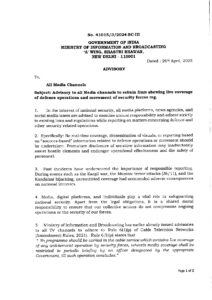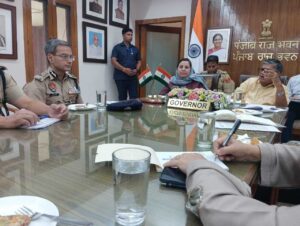Union Home, Health Secys chair high-level meet to enhance safety of healthcare professionals
New Delhi [India], August 28 (ANI): In response to the Supreme Court’s August 22 order, Union Home Secretary Govind Mohan and Union Health Secretary Apurva Chandra co-chaired a virtual meeting in Delhi involving the Chief Secretaries and Directors General of Police (DGPs) from various states to implement essential safety measures for doctors and healthcare professionals.
The discussions focused on ensuring that State Governments and Union Territories (UT) take immediate actions to address safety concerns at healthcare workplaces pending receipt of the report of the National Task Force (NTF) to address the concerns of the doctors over their safety at their workplaces.
This follows the National Task Force’s (NTF) initial meeting, chaired by the Cabinet Secretary TV Somanathan, which took place on Tuesday.
Atul Goel, Director General of Health Services (DGHS) was present along with senior officials from the Ministry of Health and Family Welfare in today’s meeting.
In today’s meeting, the officers of state governments and UTs including Chief Secretaries and DPGs apprised of the steps taken by respective governments to enhance security and provide a safer working environment for healthcare workers across public and private hospitals, medical colleges and other healthcare institutions.
Interacting with the states, Govind Mohan requested the officers to ensure the installation of CCTV cameras in blind spots, integration with 112 helplines for health care workers, access control of large hospitals, and sharing of the revamped position under Bharatiya Nyaya Sanhita (BNS).
Union Health Secretary encouraged the states to come up with innovative ideas and emphasised some of the immediate measures that can be considered to enhance security and provide a safer working environment for healthcare workers such as joint security audit along with district collector and DSP, and management of District Hospitals (HDHs) and Medical Colleges (MCs) to review any shortfall in existing infrastructure and security arrangements, and to take up remedial measures.
Besides, he suggested ensuring security checks of all hired security and other services staff to be done regularly. He stressed the need for a control room, especially in large DHs and MCs, with a duty roster of staff that regularly monitors CCTV and securely stores the data; and that distress call to be attended to by control rooms.
Mock drills for security to be conducted regularly like safety drills for fire, and training of hired security personnel to upgrade their capacity; in many establishments, they are observed to be found wanting in discharging their duties due to poor capacities; patient facilitators, trolley men and MTS in large hospitals to ferry patients on wheelchairs and stretchers is required, to reduce the number of patient attendants and lessen the load and stress on security and other healthcare professionals were among other suggestions.
Capacity building and training of doctors and other healthcare workers in bereavement protocols, especially in emergency and casualty wards; security and safety committee to be institutionalized and involve senior or junior residents and students for continuous monitoring of the situation and status of emergency response preparedness; and routine security patrolling in all the hospital and medical college premises during night time were key suggestions of the health secretary.






